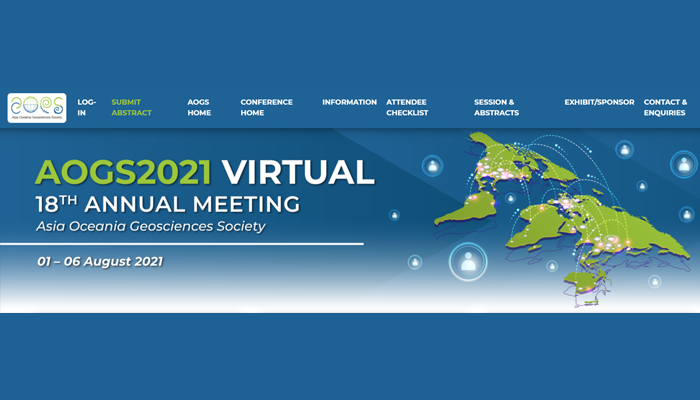Rajesh Maddu, Ph.D student working under the supervision of Dr. Shaik Rehana presented two papers at the Asia Oceania Geosciences Society (AOGS), Virtual 18th Annual Meeting held from 1 – 6 August.
- Prediction of River Water Temperature Using the Coupling Support Vector Regression and Data Assimilation Technique – Tropical River System of India – Rajesh Maddu and Dr. Shaik Rehana.
Research work as described by the authors: The river water temperature (RWT) directly affects the river’s physical, biological, and chemical characteristics and determines the fitness and life of all aquatic organisms. Machine Learning (ML) has been increasingly adopted due to its ability to model complex and nonlinearities between RWT and its predictors compared to process-based models requiring rigorous data. The present study demonstrates how the new ML approach, Support Vector Regression (SVR), can be coupled with Wavelet Transformation (WT) to predict accurate RWT estimates with the most appropriate form of AT. Further, the proposed ML approach has been combined with the WT and Ensemble Kalman Filter (EnKF), data assimilation (DA) technique (WT-SVR-EnKF) to improve the predicted values based on the measured data. The proposed modelling framework’s effectiveness is demonstrated with a tropical river system of India, the Tunga-Bhadra river, as a case study. Results indicate that the combination of WT and EnKF model (WT-SVR-EnKF) yields a better model than the conventional SVR and hybrid model of air2stream for RWT prediction. The study demonstrates how ML methods can be coupled with WT and DA techniques to generate accurate RWT predictions in river water quality modelling.
- Reservoir Inflow Forecasting Based on Gradient Boosting Regressor Model – A Case Study of Bhadra Reservoir, India – Rajesh Maddu, Indranil Pradhan, and Dr. Shaik Rehana.
Research work as described by the authors: Reservoirs are essential infrastructures in human life. It provides water supply, flood control, hydroelectric power supply, navigations, irrigation, recreation, and other functionalities. To provide these services and resources from the reservoir, it’s necessary to know the reservoir system’s inflow. The Machine Learning (ML) techniques are widely acknowledged to forecast the inflow into the reservoir system. In this paper, the popular ML technique, Gradient Boosting Regressor (GBR), is used to predict the reservoir system’s inflow. This technique has been applied to the Bhadra reservoir of India at a daily time scale. In this study, the effect and complex relationship of climate phenomenon indices with inflow has been considered. The considered climate phenomenon indices are (1) Arctic Oscillation (AO), (2) East Pacific/North Pacific Oscillation (EPO), (3) North Atlantic Oscillation (NAO), (4) Extreme Eastern Tropical Pacific SST (NINO1+2), (5) Eastern Tropical Pacific SST (NINO3), (6) Central Tropical Pacific SST (NINO4), (7) East Central Tropical pacific SST (NINO34), (8) Pacific North American Index (PNA), (9) Southern Oscillation Index (SOI), (10) Western Pacific Index (WP), (11) Seasonality. In this paper, different parameter settings have been discussed on the models’ performances. The analysis of the GBR method for the Bhadra reservoir includes the number of estimators, maximum depth. The results indicate that the GBR model can capture the inflow’s peaks and droughts into the reservoir systems. The study demonstrates how ML methods can be used to generate accurate reservoir inflow predictions.
Asia Oceania Geosciences Society (AOGS) is one of the largest conferences in the Geoscience domain, with various abstracts and distinguished lectures from esteemed faculty worldwide. Rajesh says, “To become a capable researcher in data Science technology area with the Water Resources domain field by analyzing problems related to the real world, and it will help me develop a field specialty. Understanding water quantity, quality modeling, and predictions with hybrid approaches will help manage water resources for the present and future generations”. He adds that the research environment at IIIT is designed to help students pursue their area of interest. None of this would have been possible if not for the timely guidance and motivation from his guide Dr. Shaik Rehana. Because of this, he could meet professionals and researchers virtually in this domain.

